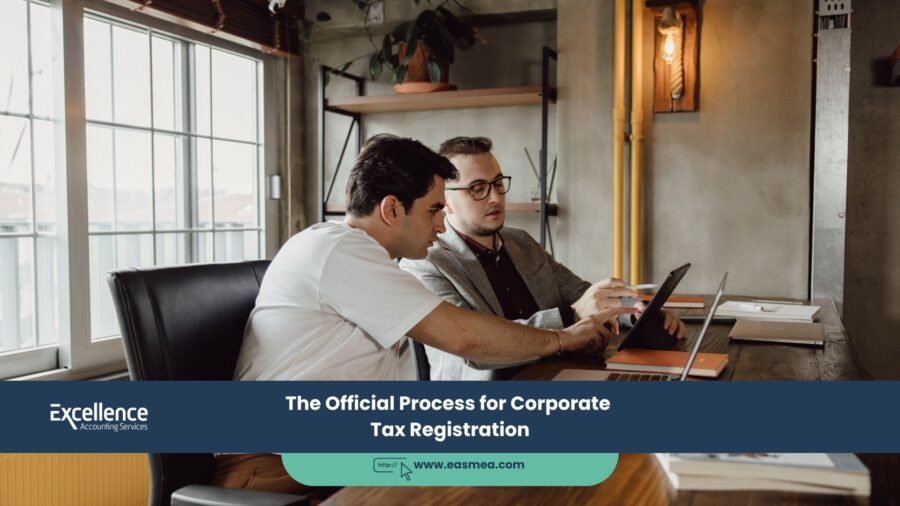The Official Process for Corporate Tax Registration: A Step-by-Step Guide
With the full implementation of the UAE’s Corporate Tax (CT) regime, the question for businesses is no longer “if” they will be affected, but “how” they must comply. The absolute first step on this journey of compliance, a non-negotiable legal requirement for the vast majority of businesses in the country, is Corporate Tax registration. This is not merely an administrative formality; it is the fundamental process of identifying your business to the Federal Tax Authority (FTA) and officially entering the national tax system.
- The Official Process for Corporate Tax Registration: A Step-by-Step Guide
- Part 1: Who is Required to Register for Corporate Tax?
- Part 2: Pre-Registration Checklist - Your Document Arsenal
- Part 3: A Step-by-Step Walkthrough of the EmaraTax Application
- Part 4: The All-Important Registration Deadlines
- How Excellence Accounting Services (EAS) Streamlines Your CT Registration
- Frequently Asked Questions (FAQs)
- Feeling Overwhelmed by the Registration Process?
The FTA has made the process digital and streamlined it through its EmaraTax platform. However, the apparent simplicity of an online form belies the importance of getting it right. Errors, delays, or a misunderstanding of the requirements can lead to a significant AED 10,000 penalty for late registration. This definitive guide will serve as your roadmap through the entire official process. We will detail who is required to register, the documents you must prepare, a granular step-by-step walkthrough of the EmaraTax application, and the critical deadlines you cannot afford to miss. Mastering this process is the bedrock of a sound UAE Corporate Tax compliance strategy.
Key Takeaways on Corporate Tax Registration
- Registration is Mandatory: Nearly all businesses in the UAE, including Free Zone entities and individuals with business licenses, must register for Corporate Tax.
- The Portal is EmaraTax: Registration is done exclusively online through the FTA’s EmaraTax platform.
- Deadlines are Staggered: The deadline to register is not the same for everyone; it is based on the month your business license was issued.
- Late Registration Penalty is AED 10,000: Failing to register by your specified deadline results in a substantial, non-negotiable penalty.
- Preparation is Key: Having all your documents and information ready before you start the online application will save time and prevent errors.
Part 1: Who is Required to Register for Corporate Tax?
The scope of the UAE Corporate Tax law is broad. The default assumption for any business should be that they are required to register. The law identifies a “Taxable Person” as the entity that must register. This includes:
1. Juridical Persons (Companies and Entities)
- Mainland Companies: All LLCs, Public Joint Stock Companies, and other entities incorporated in the UAE mainland.
- Free Zone Companies: All businesses incorporated or registered in a Free Zone. This is a crucial point: even if a company qualifies for the 0% CT rate as a “Qualifying Free Zone Person,” it must still register for Corporate Tax.
- Foreign Legal Entities: Companies incorporated overseas that have a branch in the UAE or are effectively managed and controlled from within the UAE.
2. Natural Persons (Individuals)
- Individuals who hold a commercial license or permit to conduct business in the UAE (e.g., freelancers, sole proprietors). They must register for CT if their total business turnover exceeds AED 1 million in a calendar year.
3. Non-Resident Persons
A non-resident person must register for Corporate Tax if they have a “Permanent Establishment” (PE) in the UAE or if they derive state-sourced income from the UAE. Determining a PE is complex, often requiring a professional due diligence review of activities.
The Golden Rule of Registration: If you have a trade license in the UAE, you almost certainly need to register for Corporate Tax. Profitability is not a factor. Even if you anticipate having zero taxable income or qualifying for an exemption, the legal obligation to register remains.
Part 2: Pre-Registration Checklist – Your Document Arsenal
Before you even navigate to the EmaraTax website, you must gather your information. A prepared applicant will find the process smooth; an unprepared one will face frustration and delays. Here is your essential checklist:
| Document/Information | Details Required |
|---|---|
| Trade License/Business Permit | A clear, valid copy. The license number and issuance date are critical. |
| Owner/Manager Identification | Passport and Emirates ID copies for all owners, partners, and the appointed manager. |
| Constitutional Documents | Memorandum of Association (MOA), Articles of Association (AOA), or any other relevant formation documents. |
| Contact Information | The business’s registered address, PO Box, phone number, and a valid email address. This email will be used for all official FTA communications. |
| Authorized Signatory | Name, contact details, Passport, and Emirates ID of the individual who is authorized to act on behalf of the company for tax matters. |
| Financial Year Information | You must know your company’s financial year start and end dates (e.g., 01 January to 31 December). This determines your first Tax Period. |
| Bank Account Details | The company’s primary bank account number and IBAN. |
Ensuring all these documents are up-to-date and readily available in a digital format (PDF, JPG) will make the online submission process significantly faster. This is a foundational step in good accounting and bookkeeping hygiene.
Part 3: A Step-by-Step Walkthrough of the EmaraTax Application
The registration process is conducted entirely through the FTA’s digital tax service platform, EmaraTax. If you are already registered for VAT, you will use the same account.
Step 1: Create or Log in to Your EmaraTax Account
Navigate to the EmaraTax portal. If your business has no prior tax registrations, you’ll need to create a new account using your email address and setting a password.
Step 2: Navigate to Corporate Tax Registration
Once logged in, you will see a list of taxable persons linked to your profile. Select the entity you wish to register. On the dashboard, find the “Corporate Tax” tile and click on “Register”.
Step 3: Review Entity Details
The system may pre-populate some details from government records. Carefully review this information for accuracy. The first part of the application will ask you to identify your business type (e.g., juridical person, natural person).
Step 4: Provide Identification Details
This is a critical section where you will provide:
- Details of your primary business activity.
- Information about all other business activities listed on your license.
- Details of the company’s owners and top-level management.
- Confirmation of your ultimate beneficial owner (UBO).
Step 5: Enter Your Financial Year and First Tax Period
You must specify your accounting period start and end dates. Based on this, the system will determine your first CT Tax Period. For example, if your financial year is Jan-Dec and the CT law started on 1 June 2023, your first tax period will be 1 January 2024 to 31 December 2024.
Step 6: Upload Supporting Documents
This is where your prepared document arsenal comes into play. You will be prompted to upload the documents from the checklist above. Ensure the scans are clear and legible.
Step 7: Review and Submit
The final step is a comprehensive review of all the information you have entered. Read through every field carefully. Any mistake can cause delays. Once you are certain everything is correct, you will check a declaration box and submit the application.
Step 8: Await Confirmation
After submission, the application goes into a review queue at the FTA. You will receive an email confirmation that it has been received. The FTA will review the application and, if everything is in order, will issue your Corporate Tax Registration Number (TRN). This process can take anywhere from a few days to a few weeks.
Part 4: The All-Important Registration Deadlines
The FTA has been very clear about registration deadlines to manage the influx of applications. The deadline is not one-size-fits-all. It depends on the month in which your business license was first issued, irrespective of the year.
| License Issuance Month (Regardless of Year) | Corporate Tax Registration Deadline |
|---|---|
| January or February | May 31, 2024 |
| March or April | June 30, 2024 |
| May | July 31, 2024 |
| June | August 31, 2024 |
| July | September 30, 2024 |
| August | October 31, 2024 |
| September or October | November 30, 2024 |
| November or December | December 31, 2024 |
| New entities incorporated after March 1, 2024 | 3 months from the date of incorporation |
Warning: Missing your deadline will result in an automatic AED 10,000 penalty. There is very little room for appeal on this. Knowing your deadline is a fundamental compliance responsibility.
The first step towards meeting this deadline is a proper company formation process where all dates are correctly recorded.
How Excellence Accounting Services (EAS) Streamlines Your CT Registration
The Corporate Tax registration process, while digital, is fraught with potential pitfalls. A single error can lead to delays or incorrect tax positioning. EAS ensures a seamless and accurate registration from start to finish.
- Pre-Registration Assessment: We analyze your business structure and activities to confirm your registration requirements and identify any special considerations (e.g., Free Zone status, potential for a Tax Group).
- Document Compilation and Review: Our team assists you in gathering and reviewing all necessary documents, ensuring they meet FTA standards before the application even begins.
- End-to-End Application Management: We handle the entire online submission process on your behalf, navigating the EmaraTax portal with precision to guarantee accuracy and completeness.
- Post-Registration Support: Once your TRN is issued, we provide guidance on next steps, including setting up your accounting systems and preparing for your first tax period. A proper accounting system implementation is crucial.
Frequently Asked Questions (FAQs)
Yes, absolutely. Registration is mandatory for almost all Free Zone entities, regardless of whether they are a “Qualifying Free Zone Person” eligible for the 0% rate or not. Registration is the process of identifying yourself to the FTA; tax payment is a separate, subsequent step.
The administrative penalty specified by the FTA for failure to submit a registration application within the prescribed timeline is AED 10,000.
Yes. The EmaraTax portal is a unified platform for all taxes in the UAE. If your business is already registered for VAT, you will use the same login credentials and simply add the Corporate Tax registration to your existing entity profile.
You must register for Corporate Tax if your annual turnover from your freelance business activities exceeds AED 1 million in a calendar year. If your turnover is below this, you are not required to register for CT, but you must still keep proper financial records to monitor your position.
While timelines can vary, most straightforward applications are processed and a Tax Registration Number (TRN) is issued within 5 to 20 working days. If the FTA requires additional information or clarification, the process may take longer.
If you discover a mistake after submission, you should not submit a new application. Once your registration is approved, you can amend the details through your EmaraTax account. There is a specific option to “Amend Corporate Tax Registration” where you can correct the information and submit it for FTA approval.
Yes. The requirement to register is based on your legal status (i.e., having a business license), not on your profitability. Your business must be registered even if it is making a loss.
Yes, but it’s a two-step process. First, each individual company must complete its own separate Corporate Tax registration and obtain its own TRN. After that, the parent company can apply to form a Tax Group with its subsidiaries, provided they meet the specific conditions (e.g., 95% ownership).
For any new juridical person incorporated on or after March 1, 2024, the deadline for submitting a CT registration application is three months from the date of their incorporation or establishment.
Your financial year-end date is critical because it determines your first Tax Period under the Corporate Tax law. The FTA needs this information to establish the timeline for your future tax return filings and payments. It’s essential for a service like financial reporting.
Conclusion: Your First Step Towards Corporate Tax Compliance
Corporate Tax registration is not a task to be postponed or taken lightly. It is the mandatory entry point into the UAE’s new tax era. By understanding your obligations, preparing your documents methodically, and navigating the EmaraTax portal with care, you can meet your deadline, avoid penalties, and set a course for smooth and successful tax compliance. This first step, when taken correctly, builds a strong foundation for all your future tax responsibilities.




